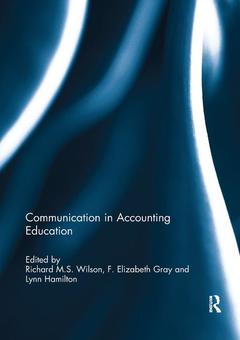Communication in Accounting Education
Coordonnateurs : Wilson Richard M.S., Gray F. Elizabeth, Hamilton Lynn

Accounting, often described as "the language of business", requires a diverse set of written, listening and oral communication skills if those who practise it are to be effective. Given the pace of change relating to, for example, the evolution of international accounting standards and the demands for greater transparency, accountants must be clear, responsive, and audience-focussed communicators.
Employers of accountants consistently comment on the need for their new graduate recruits and trainees to have strong written, oral, and interpersonal communication skills. In this light, accounting educators face the challenge of designing and delivering programmes that reflect professional expectations on the part of employers and clients, and educating students on how to make informed communication choices in order to achieve desired results and to build good working relationships.
The chapters in this book deal with such topics as accounting students? perceptions of oral communication skills; competence-based writing skills; and the development of listening skills.
This book is derived from articles originally published in Accounting Education: an international journal.
1. Communication in Accounting Education2. The Communication Skills of Accountants: What we Know and the Gaps in our Knowledge3. ‘Lights, Camera, Action!’ Video Technology and Students’ Perceptions of Oral Communication in Accounting Education4. A Business Communication Module for an MBA Managerial Accounting Course: A Teaching Note5. Effects of Interspersed versus Summary Feedback on the Quality of Students’ Case Report Revisions6. A Successful Competency-Based Writing Skills Development Programme: Results of an Experiment7. ‘A distinguishing factor’: Oral Communication Skills in New Accountancy Graduates8. A Qualitative Exploration of Oral Communication Apprehension9. Developing Accounting Students’ Listening Skills: Barriers, Opportunitie and an Integrated Stakeholder Approach10. Accounting Students in an Australian University Improve their Writing: But How Did it Happen?
Richard M S Wilson has been active internationally in educational policy-making on the interface of accounting education and training for more than 40 years; has worked as an accounting educator in more than a dozen countries; has published widely; is the founding editor of AccountingEducation: an international journal; and holds two Lifetime Achievement Awards (one specifically for his work in the field of accounting education).
F. Elizabeth Gray is Associate Head of Massey University’s School of Communication, Journalism, and Marketing, New Zealand, where she teaches courses in professional writing, editing and publishing. She has ongoing research interests in written and oral communication demand in scientific and business workplaces, as well as in the fields of nineteenth-century journalism.
Lynn Hamilton is Associate Professor and Director of Management Communication Programs at the McIntire School of Commerce, University of Virginia, U.S.A. She teaches managerial writing, communication strategy, oral presentation skills, media relations, and crisis communication. She has a particular interest in organizational and professional storytelling.
Date de parution : 03-2018
17.4x24.6 cm
Date de parution : 11-2014
17.4x24.6 cm
Thèmes de Communication in Accounting Education :
Mots-clés :
Oral Communication Apprehension; DCU Business School; Te Ch; Develop Accounting Students; Peer Assessment; Oral Communication Skills; MBA Programme; Accounting Graduates; Accounting Communication; CPA Australia; Accounting Education; IAESB; Graduate Attributes; Accounting Subjects; Interpersonal Communication; Written Case Analyses; Presentation Skills; Graduate Accounting Courses; Richard M; S; Wilson; Written Communication Skills; Written and Oral Communication Skills; Intermediate Financial Accounting; Accounting Educators; Summary Feedback; Feedback Placement; Listening Development; Mid-level Students; Exit Test; International Education Standard; Improving Student Writing Skills; Accounting Curriculum; Professional Accounting Bodies



